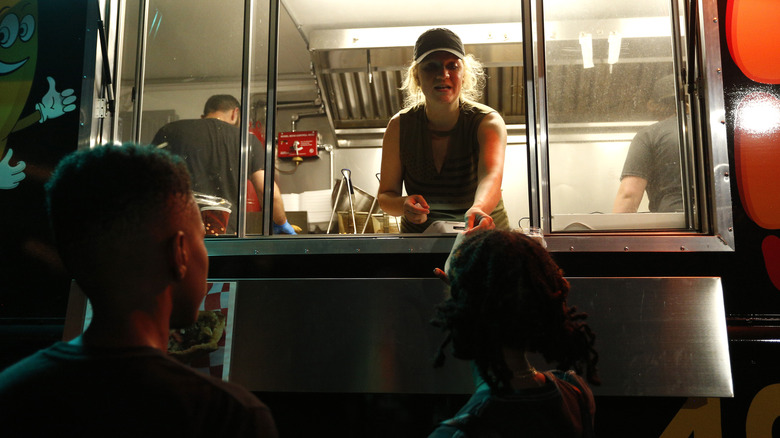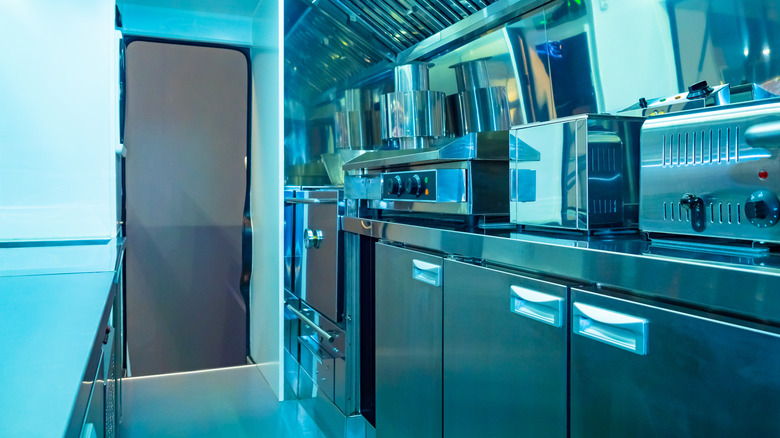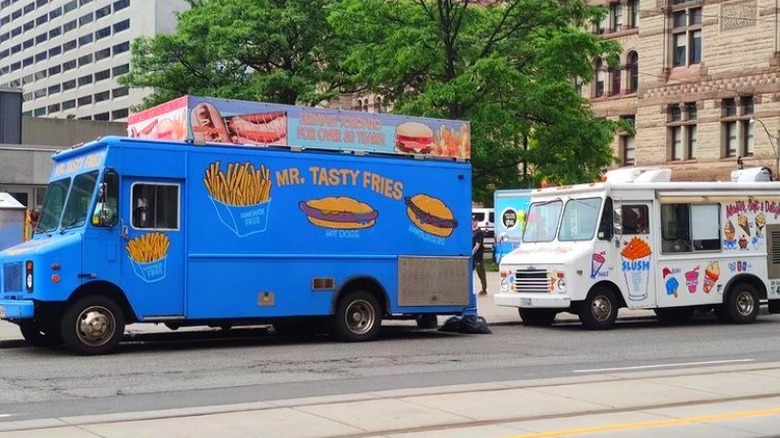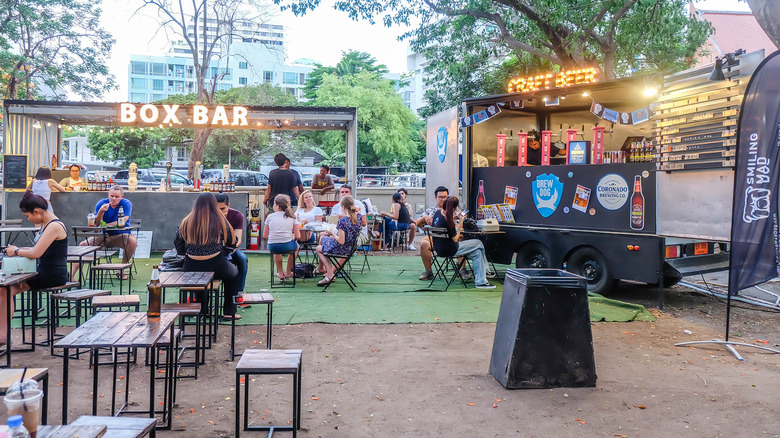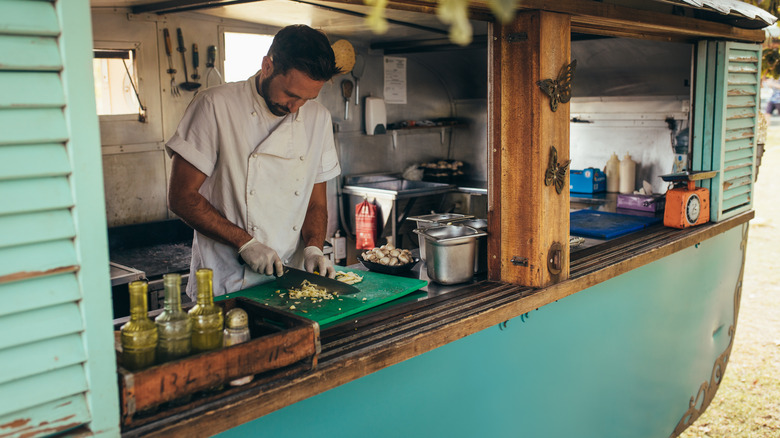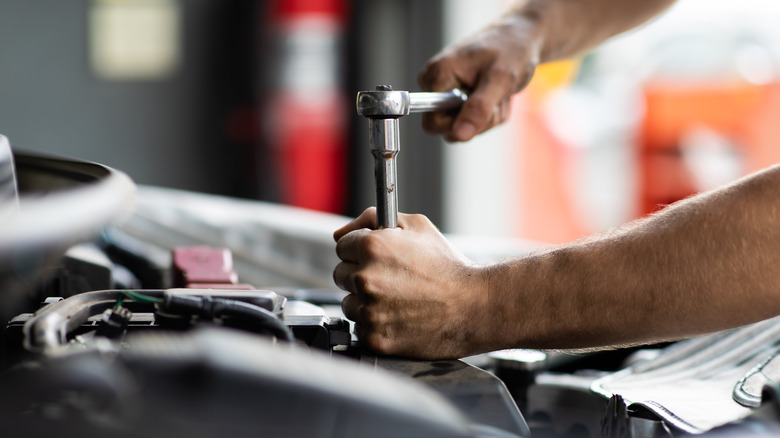What's It Really Like Working On A Food Truck
Fads and trends come and go in the culinary world. What was once the "in," thing is already well on the way out by the time it reaches your store's shelves. Do we all still remember when we slapped bacon on everything? Yet one fairly recent change to the restaurant scene has endured and thrived, and that is taking the restaurant on the road. Food trucks (even with higher gas prices) are seemingly here to stay and are continuing to grow in popularity for both restaurateurs and the public. For the owners and operators, food trucks have a much lower bar of investment when compared to brick-and-mortar restaurants. Food trucks also have the mobility of being an eatery with an engine, allowing them to find those hungry crowds to sell to, especially with more cities welcoming food trucks with their own public spaces.
But what is it like to actually work in a food truck? Much like working in the wider restaurant biz, it's a high-energy, high-demand, exciting, and often exhausting job no matter what your position is.
Learning To Multitask Helps
Even the biggest food trucks are working on a limited space, meaning a much smaller staff. Not only will you be learning your job on the fly at a breakneck pace, but also the jobs of nearly everyone else on staff. Budgets Are Sexy gave an account of side-hustling on a food truck, and the three main sticking points to successfully working on a food truck are speed, utility, and adaptation. You're going to learn and learn fast what the menu is, how to take orders, prep the kitchen, and make emergency trips to the grocery for extra ingredients.
And your job can quickly change, day by day, even hour by hour. You may start the day making sauces or chopping ingredients for the kitchen staff, only to then grab a pad and pen to take orders, then throw on an apron to help with food prep, and possibly drive the truck back to the garage to clean at the end of the day. Working a food truck can often mean that you'll be filling a different role as needed.
You'll Build Comradery With Your Coworkers
It really helps if you're comfortable working shoulder to shoulder with your fellow food truck employees. Take your average restaurant kitchen, which can often be cramped enough with kitchen and waiting staff flying back and forth, using seemingly impossible feats of dexterity and foresight to avoid colliding into one another. Now, make it even smaller and somehow even more cramped, and that's what it's like working in a food truck. According to CoverWallet, food truck season really picks up in the summer, so you'll be working long hours in an 8 x 10 metal box next to a blistering hot stove on sweltering humid days while maneuvering around coworkers while you're all pressed in like sardines.
And yet, working side by side in a small food truck crew can be an exhilarating, almost humanity-reaffirming experience, at least according to Mandy Sargent of Thought Catalog. There's little room for harshness or animosity in that tiny kitchen when several dozen hungry customers are waiting on their orders. Almost like serving on a ship, your crewmates will back you up when you need them, and in time come to rely on and put their trust in you. Though mistakes like food being spilled, or orders being screwed up happen like in any kitchen, it pays to own up, learn, and then move on.
Keeping Calm Amid The Chaos Is Essential
Key components of making it through your shift are to keep your cool and maintain your patience as you fill dozens of orders, support the kitchen staff, and navigate the often turbulent waters that is working a food truck. Food Truck Operator conducted interviews with various owners, and the two qualities to make it in the business are patience and the ability to stay chill through the worst of days.
Much like any other food service business, there will be good days and bad, and those days where "Murphy's Law," seems to take full effect. A venue could cancel, food can run out, or a seemingly essential co-worker may call off at the last minute. Losing your patience or even worse — your temper — is guaranteed to make a bad situation even worse as you won't be able to think straight if you're seething with anger. The best food truck owners and employees know how to stop, take a breath and seek either a solution or a workaround to a problem with a clear mind. Success doesn't happen overnight, and bad days will come and go. Keeping a level head through a bad day is often the secret to turning it completely around.
You'll Be Working Long Hours
Depending on what your roles are as part of a food truck crew, you could be working from sunrise to sunset very easily. Food Truck Empire states that working full-time at a food truck could be between 60 to 80 hours on the job, especially if the business is just starting out. What customers see when a food truck is pulled up and in full swing is only just a fraction of the amount of prep work that goes into making sure those scant couple of business hours go by relatively smoothly.
The majority of food truck work happens behind the scenes with a menu being created, and ingredients to be purchased and prepared beforehand. Depending on the menu, you may need to either hit your local grocery, or several local specialty shops if your food truck serves more artisanal food. If you're an owner, then you'll also have to play business administrator as you'll be lining up a venue, coordinating with suppliers, networking with other business owners, PR on social media, and vehicle maintenance. You'll even need to factor in time to drive to your serving location. Oftentimes, all of this regular prep work is just to open just one day a week for less than four hours! If you're looking to own or go full-time with a food truck, get ready to dedicate lots of your time.
Sanitation Is Everything
Just as much if not more than a regular restaurant, a food truck has to maintain as clean an environment as possible. An interview with members of Mei Mei Street Kitchen by Boston Food Truck Blog explained that food trucks are often held to the same standards of brick and mortar restaurants by health inspectors. Not only that, but unlike a restaurant, customers can easily see what's going on in the kitchen when they place an order, so there's a very strong incentive to maintain a level of cleanliness for the sake of your customer's confidence.
Thankfully, the nature of food trucks allow them to be quickly and easily cleaned as they're broken down and put away after business hours. In fact, there's such an emphasis for food trucks to stay clean and sanitary that a study reported by Boston Magazine showed that the stigma against food trucks being dangerously unsanitary is based on pure myth. A study of past health inspections conducted by a non-profit civil liberties law firm revealed that food trucks scored higher on health inspections when compared to brick and mortar restaurants. Where restaurants received four violations on average per inspection, food trucks actually averaged out at less than three.
Cost is Low, So Is The Bar For Failure
While the initial costs of starting a food truck business is comparatively lower than that of your standard restaurant, the threat of failure is just as high. On average, FSR reported that 60% of restaurants fail within the first year in business, namely because right from opening day they are working at a loss, and a food truck is no different.
According to Truckster, even taking out the costs of the vehicle, food, and labor, there are still numerous expenses that can sink a food truck without proper budgeting. The vehicle needs to be properly fueled and maintained, and not just the truck as transportation but as a kitchen as well. There's insurance, and legal fees such as city, county, and state permits required to operate legally. Many food trucks need to rent storage space for their vehicle, as well as space to conduct business. Failure to take these into account means your budget will be overwhelmed, and your food truck business will be in the red that much faster.
Too often, most restaurants and food trucks crash and burn because not enough forethought was given to the enterprise. Among Legion Food Trucks' reasons for why most businesses fail are a lack of identity and what they want to offer customers. You can have a burger food truck, but how will it stand out from every other burger food truck out there? Giving yourself the time to establish a unique identity and service now will pay dividends in the future.
You'll Need To Be A People Person
There's a lot of emotional lifting when you're working in the service industry, and a food truck is no different. You could quickly move from taking orders to relaying those orders to the kitchen, to filling in on any tasks that need your assistance. Whether it's your co-workers or a customer, you're asked to maintain a professional and positive attitude, and you'll need good communication skills. If food truck work interests you then take some advice from Food Truck Operator on hiring seasonal staff.
While many of your skills will be learned on the job, the top qualities sought out in food truck staff are the ability to learn quickly and to have an upbeat attitude. If your boss is creating a positive atmosphere on the job, then it helps to meet that energy with your own. Even when things don't go exactly right during business hours, maintaining open communication, professional courtesy, and polite etiquette can help even the most stressful days go smoother. Not only does this help with customers, but with staff as well. Treating your fellow co-workers well can ease the tension during or after a sudden mid-morning or afternoon rush of orders. And keeping the lines of communication open can help you be more prompt when it comes to filling in the needs that arise constantly for a food truck.
Persistence Actually Does Pay Off
Oftentimes, one of the secrets to success involves simply showing up. If you're looking to own and operate a food truck business this is especially true. If you want an example of how to run a food truck, during a pandemic, while also taking part in a televised food truck contest, then check out our exclusive interview with Daniel Shemtob.
Daniel's business, The Lime Food Truck, was not only part of "The Great Food Truck Race" TV show on Food Network, but he also ran his business during the height of the COVID-19 pandemic. While he clearly had a blast on the show, it was also a very stressful experience for him and his crew. What can be quickly gleaned from his interview, was how through the worst of it, he kept putting in the time and effort needed to try and make his business a success. It can require networking with other food truck businesses, prepping your crew for a busy event, or updating your current menu, but the first step involves your presence and your ability to be present.
There Will Always Be Expenses
If you think a food truck is your dream business, then make sure you've got a budget ready. According to On The Line, the food truck industry is a $2 billion dollar market in the U.S. alone, but the expenses to own and run your own food truck is something like carrying water in a bucket filled with holes.
Remember that a food truck might cost less than a full restaurant, but you'll need to meet the costs of both an operational kitchen, and an on-road industrial van. That means a kitchen space with utensils, cooking space, and refrigeration, as well as remaining fully stocked on ingredients. Your vehicle alone needs to be road-ready, covered by insurance, and full permits to operate as a business. According to food truck veterans, working with a lawyer and accountant will quickly pay for themselves while they help you find permits that fit your budget. Also, consider investing in technology that makes conducting your business easier. This can include "Point Of Sale," systems that allow customers to see the changes to your menu as it's updated.
Basic Road Maintenance Helps
If you know even a little bit of vehicle repair and maintenance, it can save a lot of trips to your local mechanic. There's a lot that can break down with your food truck, even just through regular wear and tear. If you're looking to save money, then picking up some rudimentary vehicle maintenance skills will not only save you money but will come through in a pinch in an emergency like a flat tire or an overheating engine.
Mobile Cuisine lists a wide range of items on a food truck that you should be able to do yourself. The number of things you can fix on your food truck goes well beyond flat tires or changing oil. It helps to learn how to change spark plugs, flush out your radiator, replace your battery, and change out the parts to your vehicle's dashboard. As always be patient and take your time and soon you'll start to better understand your food truck as a vehicle and be able to more effectively keep it in tip-top shape.
The Chef Is The Key Ingredient
In any kitchen, the chef is the center of the universe. According to Go Truckster, hiring a quality chef is an often overlooked aspect when starting a food truck. And yet, the chef has the ability to transform the menu, the food, and almost the overall food truck business from good to astounding.
However, a chef won't be able to get one order out without the staff giving them consistent support. No matter what position you hold in a food truck, chances are you'll be assisting the chef in some way. When things are busy there will always be orders sent out, sauces to prepare, ingredients to either chop or measure out, and more often than not an emergency run to the store for more integral supplies. Learning how to coordinate around your chef or cooking crew is one of the most important aspects of running a successful food truck.
Cooperation And Productivity Go Hand In Hand
The thing to know about working on a food truck may be that you are not alone. You might be part of a small crew, but working together, coordinating your tasks, and backing each other up is what makes a food truck a success at the end of the day. Mobile Cuisine lays out the qualities that can make you a strong member of your food truck crew, whether you're an employee, chef, or even the owner.
Prioritizing teamwork and emphasizing self-discipline means that you come to the food truck thinking less of yourself as just another employee, and more as a part of a larger system. In this aspect, you're an integral component of the food truck's operation, and you'll recognize that same value in your coworkers. It takes reliability, empathy, and a strong desire to learn as much as you can so you can assist with different roles in the food truck when needed. It's not easy, but for those who work in the food truck business, it can be thrilling and rewarding on a personal level.

